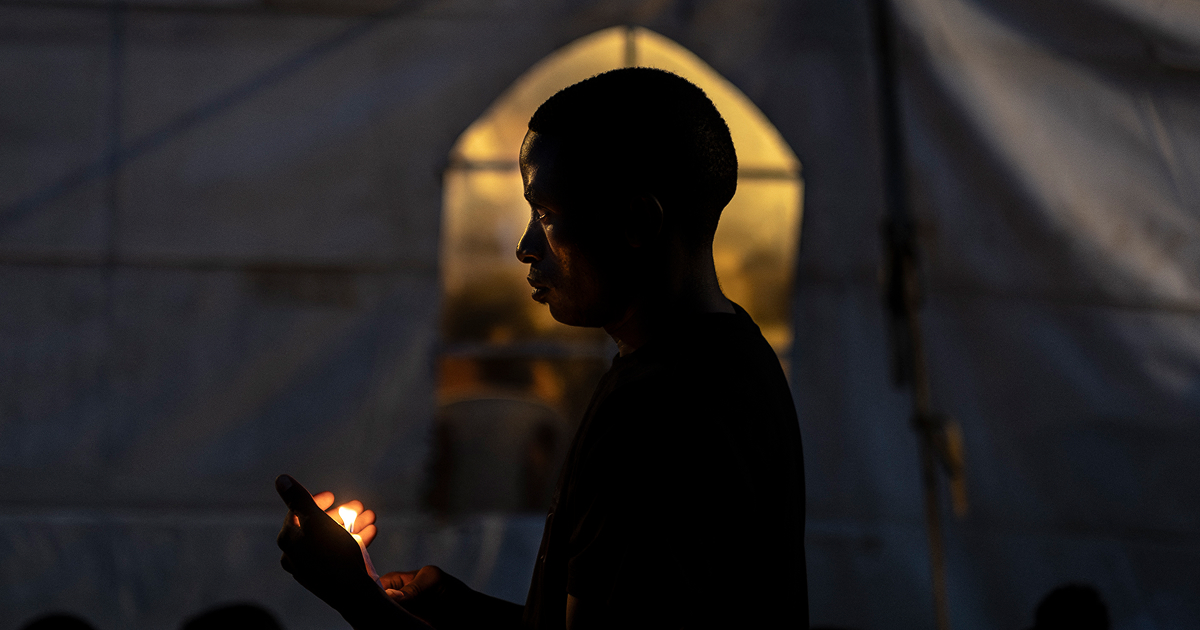At the Feeding of the Five Thousand, Jesus miraculously transformed five loaves and two fish into so much food that – even after the huge crowd had taken their fill – there were leftovers. In the biblical story, Jesus told his disciples to “gather the pieces that are left over”, so “nothing be wasted”; they collected 12 entire baskets full. Today, a staggering third of the food we produce globally goes to waste, and preventing perfectly good food from ending up in the bin is a pressing part of the battle against climate change. In the UK alone the food thrown away each year creates the CO2 equivalent of 4.6 million return flights from London to Perth. But long before we knew of global warming, wasting food was condemned from a religious standpoint.
In the Tudor era, a religious outlook was almost entirely universal, and the Reformation heightened religious fervour. Medical theories posited that food sustained earthly life by literally replenishing flesh that was used up day-to-day. And, of course, it is bread and wine that become Christ’s Body and Blood in the Mass. Unsurprisingly, then, food was seen in early modern Christianity as a divine gift; to waste it was sinful. In a treatise of 1631 the Puritan preacher John Ball wrote that food on the plate “is not ours” but rather “the Lord’s”. “All the provision are gifts of his mercie in Iesus Christ,” he said. Of anything remaining after a meal, he went on, “reserueth it for good vse”.
Another biblical story taught the laity what to do with their leftovers. In the parable of Dives and Lazarus, the rich man ate lavishly and the beggar Lazarus came to the gates of his home unsuccessfully seeking to glean the crumbs. Lazarus ascended to heaven when he died whereas the rich man went to hell. Like Lazarus, the Tudor poor waited at the gates of grand households for scraps from feasts.
In 1526, everyone in King Henry VIII’s court was ordered to send their leftover food and drink to the scullery where the almonry had placed two vessels – one for solids and one for liquids. From medieval times, an almoner also collected the first slices of meat as a charitable offering. Those with less were still instructed to give what they could to less fortunate neighbours as a way of expressing their piety. The whey that remains after cheese-making, for example, could become a refreshing drink for the poor who toiled in the fields.
In the Elizabethan period, attitudes towards charity began to change. Unlike the Catholic medieval period, when wealthy individuals in theory distributed food to all in need, the unemployed, beggars and “idle wanderers” became seen as undeserving of handouts. Still, in times of scarcity the charitable giving of surplus food was encouraged with urgency from the pulpit. In 1596, when harvests were particularly bad, the Privy Council instructed clergy to urge their parishioners to skip a meal on Wednesday, Friday, and other fast-day evenings, to avoid “needless waste”, and to donate “at the least so much to the poore” as they would have normally eaten.
Many Christians today still use the yearly Lenten fast to reflect on the great value of food and to donate their kitchen surplus to those in need. Food waste continues to reflect the deep divide between the rich and poor. In 2022, 14 per cent of all adults experienced food insecurity in the UK, equating to 11.3 million people, while the average household wastes about £500 each year throwing away entirely edible food. Working against this injustice, Christian principles underline the work of the Trussell Trust, a charity that runs the majority of food banks in the UK. A network of church ambassadors supports its work to take action against hunger and poverty and “to live out their faith in God’s love”.
In 2013, Pope Francis said: “Whenever food is thrown out it is as if it were stolen from the table of the poor, from the hungry!” Wasting food is taboo in other faiths, too. In Judaism, the Mishneh Torah, expanding on the basic principle of Bal Tashchit, maintains that someone who “wastes food violates the Negative Commandment of ‘Do not destroy’”. The Koran states that “He does not love the wasteful”, and the Muslim community volunteer group Ismaili CIVIC recently partnered with FareShare, the UK’s biggest charity fighting hunger and food waste through distributing surplus food from the supply chain.
Beyond the Abrahamic tradition, the Oryoki practice in Buddhism, for example, relies on everyone taking just the right amount at the table, and leaving nothing. Common to all religions, food is seen as miraculous and humans as the Earth’s stewards. Wasting food – whether it be made from vegetative or sentient life – and the impact this has on people and planet has long sat uneasily with religious faith.
Dr Eleanor Barnett is an historian of food and religion at Cardiff University. Leftovers: A History of Food Waste and Preservation (Head of Zeus), is out now. @historyeats
At the Feeding of the Five Thousand, Jesus miraculously transformed five loaves and two fish into so much food that – even after the huge crowd had taken their fill – there were leftovers. In the biblical story, Jesus told his disciples to “gather the pieces that are left over”, so “nothing be wasted”; they collected 12 entire baskets full. Today, a staggering third of the food we produce globally goes to waste, and preventing perfectly good food from ending up in the bin is a pressing part of the battle against climate change. In the UK alone the food thrown away each year creates the CO2 equivalent of 4.6 million return flights from London to Perth. But long before we knew of global warming, wasting food was condemned from a religious standpoint.
In the Tudor era, a religious outlook was almost entirely universal, and the Reformation heightened religious fervour. Medical theories posited that food sustained earthly life by literally replenishing flesh that was used up day-to-day. And, of course, it is bread and wine that become Christ’s Body and Blood in the Mass. Unsurprisingly, then, food was seen in early modern Christianity as a divine gift; to waste it was sinful. In a treatise of 1631 the Puritan preacher John Ball wrote that food on the plate “is not ours” but rather “the Lord’s”. “All the provision are gifts of his mercie in Iesus Christ,” he said. Of anything remaining after a meal, he went on, “reserueth it for good vse”.
Another biblical story taught the laity what to do with their leftovers. In the parable of Dives and Lazarus, the rich man ate lavishly and the beggar Lazarus came to the gates of his home unsuccessfully seeking to glean the crumbs. Lazarus ascended to heaven when he died whereas the rich man went to hell. Like Lazarus, the Tudor poor waited at the gates of grand households for scraps from feasts.
In 1526, everyone in King Henry VIII’s court was ordered to send their leftover food and drink to the scullery where the almonry had placed two vessels – one for solids and one for liquids. From medieval times, an almoner also collected the first slices of meat as a charitable offering. Those with less were still instructed to give what they could to less fortunate neighbours as a way of expressing their piety. The whey that remains after cheese-making, for example, could become a refreshing drink for the poor who toiled in the fields.
In the Elizabethan period, attitudes towards charity began to change. Unlike the Catholic medieval period, when wealthy individuals in theory distributed food to all in need, the unemployed, beggars and “idle wanderers” became seen as undeserving of handouts. Still, in times of scarcity the charitable giving of surplus food was encouraged with urgency from the pulpit. In 1596, when harvests were particularly bad, the Privy Council instructed clergy to urge their parishioners to skip a meal on Wednesday, Friday, and other fast-day evenings, to avoid “needless waste”, and to donate “at the least so much to the poore” as they would have normally eaten.
Many Christians today still use the yearly Lenten fast to reflect on the great value of food and to donate their kitchen surplus to those in need. Food waste continues to reflect the deep divide between the rich and poor. In 2022, 14 per cent of all adults experienced food insecurity in the UK, equating to 11.3 million people, while the average household wastes about £500 each year throwing away entirely edible food. Working against this injustice, Christian principles underline the work of the Trussell Trust, a charity that runs the majority of food banks in the UK. A network of church ambassadors supports its work to take action against hunger and poverty and “to live out their faith in God’s love”.
In 2013, Pope Francis said: “Whenever food is thrown out it is as if it were stolen from the table of the poor, from the hungry!” Wasting food is taboo in other faiths, too. In Judaism, the Mishneh Torah, expanding on the basic principle of Bal Tashchit, maintains that someone who “wastes food violates the Negative Commandment of ‘Do not destroy’”. The Koran states that “He does not love the wasteful”, and the Muslim community volunteer group Ismaili CIVIC recently partnered with FareShare, the UK’s biggest charity fighting hunger and food waste through distributing surplus food from the supply chain.
Beyond the Abrahamic tradition, the Oryoki practice in Buddhism, for example, relies on everyone taking just the right amount at the table, and leaving nothing. Common to all religions, food is seen as miraculous and humans as the Earth’s stewards. Wasting food – whether it be made from vegetative or sentient life – and the impact this has on people and planet has long sat uneasily with religious faith.
<em>Dr Eleanor Barnett is an historian of food and religion at Cardiff University. </em>Leftovers: A History of Food Waste and Preservation<em> (Head of Zeus), is out now. @historyeats</em>

















